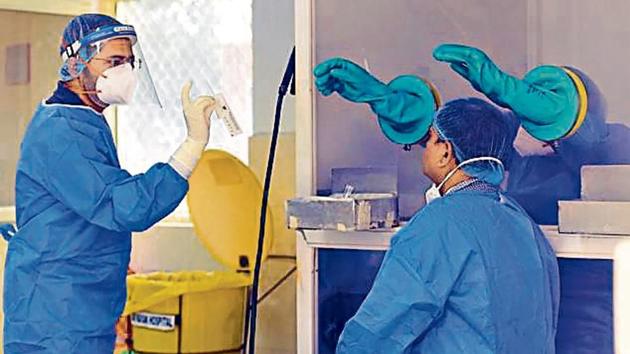Air pollution increases the risk of severe Covid-19, hospitalisations, warn experts
With pollution levels on the rise in Delhi and the entire Indo-Gangetic plains, hospitals in the city are preparing for a potential increase in the number of hospitalisations from the novel infection.
Delhi’s deteriorating air quality has prompted experts to sound the alarm about a possible increase in transmission and severity of the viral Covid-19, which ultimately may lead to more patients succumbing to the virus.

With pollution levels on the rise in Delhi and the entire Indo-Gangetic plains, hospitals in the city are preparing for a potential increase in the number of hospitalisations from the novel infection.
The dip in temperatures in the region will further aggravate the situation, officials warned.
“Covid-19 patients who were asymptomatic or relatively stable earlier, will now likely develop more severe respiratory symptoms due to the increase in the pollution levels; a higher proportion of Covid-19 patients are likely to be symptomatic. Plus, the dip in temperatures may lead to more cases — as witnessed in Europe,” said Dr Karan Madan, additional professor of the department of pulmonology, All India Institute of Medical Sciences.
Severe disease and mortality
Studies from across the world have shown that there could be an increase in the number of deaths due to Covid-19 with the increase in the levels of pollution.
A study from Italy shows that higher mortality was reported from regions, where air pollution levels were high. The mortality rate in northern Italy – where pollution levels are higher – was calculated at 12%. In comparison, the mortality rate in other parts of Italy was at 4.5%.
Another research from Europe, showed that 78% of all Covid-19 deaths were reported from five regions in Italy, France, Spain, and Germany where the levels of nitrogen dioxide was high.
A study from the Harvard University has also shown that with every 1 μg increase in PM 2.5 long term exposure, Covid-19 mortality went up by 8%. The authors of the study said that counties with higher pollution levels will have higher numbers of hospitalisations and higher numbers of deaths.
“The studies from Italy and Harvard University show the association of mortality due to Covid-19 with long term exposure to air pollution. Chronic exposure to high levels of air pollution, like that being experienced in Delhi and many parts of norther India, compromises the immune response of the respiratory system. It is well established that pneumonias (one of the most common symptoms of Covid-19) are more common and more serious in regions with high pollution levels,” said Dr GC Khilnani, former head of the department of pulmonology at the AIIMS.
The pollutants in the air also reduce the immune response of the respiratory system, thereby affecting more people.
“Pollutants inflame the respiratory tract and down-regulates the immunity of the respiratory mucosa (where the Sars-CoV-2 first attacks), making people more susceptible to the infection. Also, because the respiratory tract and tungs are already inflamed because of pollution, Covid-19 is likely to cause severe symptoms. Also, high pollution levels aggravate the symptoms of patients who already have underlying conditions like asthma, chronic obstructive respiratory disorder,. For such people, the outcome of contracting Covid is likely to be worse,” he said.
Transmission
Some studies also suggest that particulate matter may accelerate the spread of Sars-CoV-2 virus that causes Covid-19. A study conducted in Italy suggested that high concentrations of particulate matter (PM) could result in the virus forming clusters.
Another study from Wuhan, China, showed that the incidence of Covid-19 was higher in areas with high levels of PM2.5 and nitrogen dioxide concentration. Another study from southern India suggests that particulate matter, when exposed to water in the atmosphere, may encapsulate the virus leading to increase in transmission.
“The virus is mainly transmitted through droplets ejected by an infected person when they talk, sneeze or cough. These droplets may not evaporate quickly in winter and remain suspended for longer duration. Or, they might settle on the particulate matter and remain in the air for longer periods and lead to more transmission. Hence, there is a chance of increased transmission when the pollution levels go up,” said professor Sachidanand Tripathi from IIT-Kanpur who works on air pollution.
“Whether pollutants directly lead to increased transmission is not clear, but definitely the cold leads to increased transmission like any other viral infection, as they are likely to stay alive longer in the favourable temperatures,” added Dr Khilnani.




